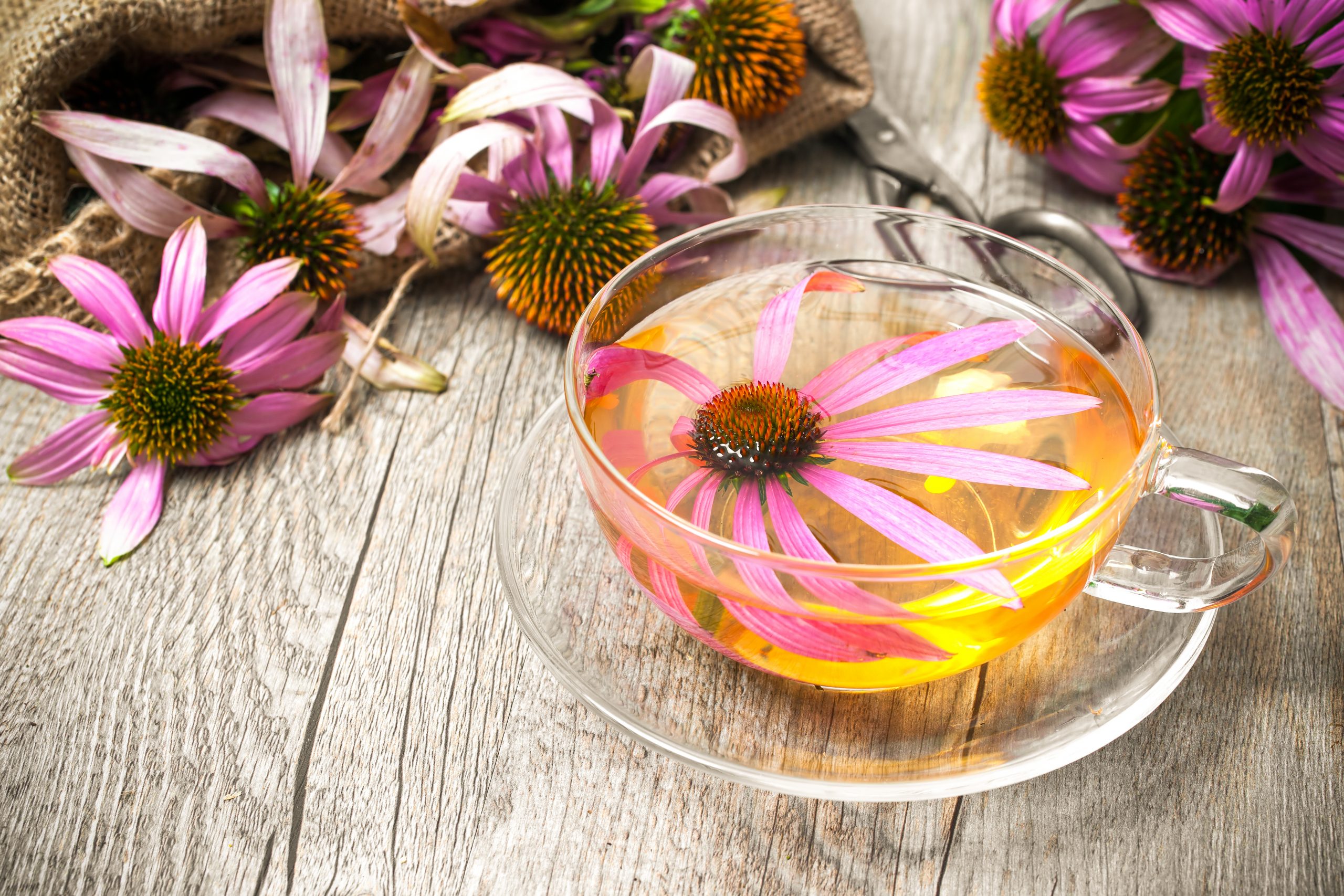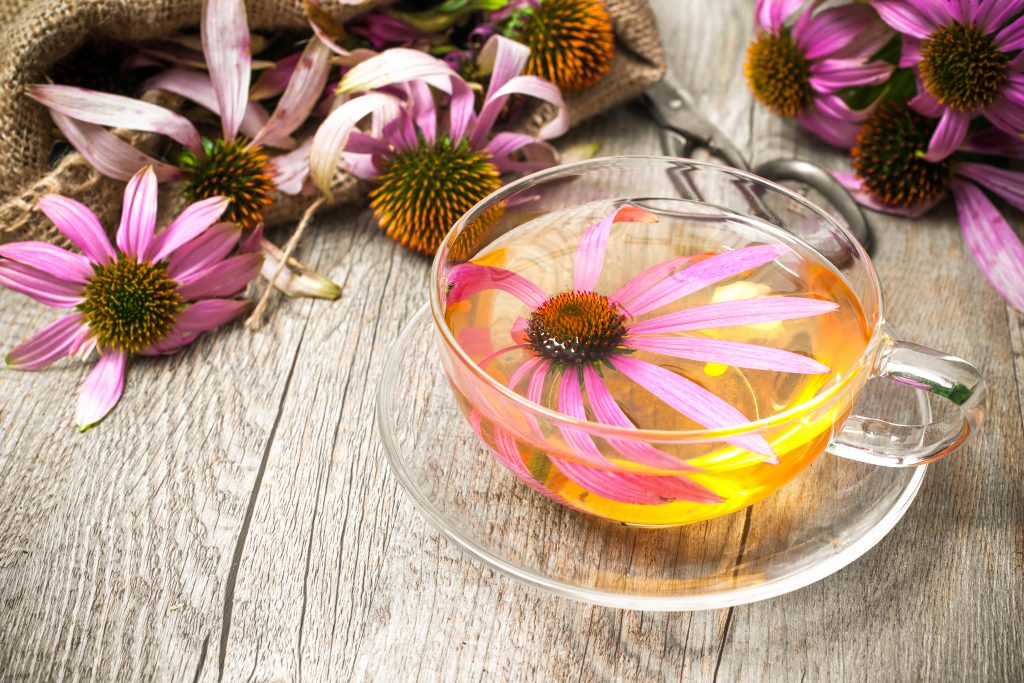Exploring Echinacea’s Role in Modern Anti-Aging Strategies

Echinacea, with its rich blend of bioactive compounds, emerges as a front-runner in the race against aging – a mighty candidate for pioneering interventions designed to extend life and elevate vitality. From enhancing the immune system to putting out inflammation’s fire, echinacea’s medicinal properties help envision a future where aging is a manageable aspect of life. Join us, and let’s explore the science behind the plant.
What Are the Health Benefits of Echinacea?
Native American tribes like the Cheyenne, Dakota, and Winnebago utilized echinacea as a critical component of their medicinal toolkit.1 Modern research focuses heavily on understanding the effects of plants’ bioactive components. In echinacea’s case – with species like Echinacea purpurea and Echinacea angustifolia as the most heavily studied – polysaccharides, alkamides, and caffeic acid derivatives are the powerhouse behind its longevity-promoting properties.2 Let’s now put this herbal wonder under the microscope and zoom in on its specific health benefits.
Echinacea’s Immunostimulatory Properties
Echinacea is packed with bioactive compounds like caffeic acid derivatives, alkamides, ketoalkenes, polysaccharides, and glycoproteins, synergistically stimulating the immune system. What does this mean? Echinacea boosts macrophage activity – critical white blood cells that clear out cellular waste and microbes – resulting in a heightened protective immune response. Echinacea also enhances leukocyte mobility, enabling these vital cells to target pathogens throughout the body effectively.1,2
The Anti-inflammatory Effects of Echinacea
Echinacea contains alkamides and caffeic acid derivatives responsible for its anti-inflammatory properties. These compounds disrupt inflammatory pathways by reducing pro-inflammatory cytokines—small proteins exacerbating inflammation. Echinacea modulates the immune response, which is particularly important in controlling low-grade chronic inflammation associated with cardiovascular disorders and certain cancers. By adjusting immune cell activity and curbing persistent inflammation, echinacea may aid in preventing the progression of these chronic conditions heavily associated with aging.1,2
Echinacea’s Potential Role in Cancer Defense
Echinacea activates Natural Killer (NK) cells—a type of lymphocyte vital for detecting and destroying cancerous or infected cells—enhancing the body’s first line of defense against tumor formation. NK cells, coupled with improved leukocyte mobility under echinacea’s influence, more effectively locate and attack cancer cells throughout the body, making echinacea a potential powerful helper in the body’s natural arsenal against cancer development and progression.1,2
Does Echinacea Preparations Cure Colds and Respiratory Tract Infections?
It’s time to tackle a popular myth. Is echinacea the cure for the common cold and upper respiratory tract infections? Not so fast. Echinacea’s ability to interfere with the binding of viruses like the influenza virus to host cell receptors and its efficacy against respiratory pathogens like Streptococcus showcase its potential as a powerful ally in fighting upper respiratory infections. Nevertheless, limited evidence suggests caution, as it seems echinacea is better at reducing the duration of colds, not preventing them.3
The benefits of echinacea offer exciting possibilities. However, it’s necessary to approach its use with informed caution. Taking echinacea short-term via the oral route is generally safe for most adults, but long-term safety remains uncertain. Its potential for allergic reactions underscores the need for careful consideration and consultation with healthcare professionals versed in complementary and herbal medicines.3

Why Do We Age?
To understand the anti-aging potential of echinacea products, it’s wise to comprehend how we age. Like the passage of time, aging seems inevitable, but is it? The contemporary scientific knowledge of aging presents a parallel interplay of genetic, environmental, and lifestyle factors. At its core, aging involves a gradual decline in physiological functions, leaving individuals more susceptible to disease and a reduced ability for cellular repair.4 However, unlike your favorite T-shirt, which gradually fades away after every wash, your body has untapped renewal capacities – that we can influence with our choices – that research is uncovering progressively.
This is the central insight for you to grasp and tell your friends and family over dinner. Phytochemicals –organic compounds produced by plants– are the primary reason why fruits and vegetables can promote human health and echinacea blossoms with phytochemicals that bolster the body’s defenses against aging. These plant chemicals awaken renewal capacities innate within us, spurring our cells to repair the damage wrought by time, in a way, making the old new.5

Can Supplements Like Echinacea Extend Your Lifespan?
Supplements like echinacea are not a cure-all that can compensate for years of unhealthy habits or a sedentary lifestyle. Instead, they should be considered complements to a clean living, filling nutritional gaps and enhancing physiological functions that may decline with age. More than an immune system booster, echinacea subtly dovetails with our body’s natural aging process. When thoughtfully incorporated into a daily regimen, this herb can tap into our inherent resilience against age-related decline. However, the optimal way to approach supplements with lifespan-promoting properties is within the frame of a carefully planned anti-aging program.6
Kyla has developed a pioneer anti-aging program based on proprietary AI technology. Our engine identifies health risks through personal health data analysis and develops intervention strategies, offering an effective way to fine-tune supplement intake. Bridging the gap between natural remedies and cutting-edge technology helps us navigate the complex path of aging with more precision and personalization. By providing insights tailored to each individual’s unique biological needs, Kyla ensures that echinacea supplementation is a strategic component of a more extensive, well-orchestrated anti-aging program for a longer, healthier life.
Conclusion
Are you wondering if echinacea and other supplements could unlock anti-aging possibilities for you? Get strategic with Kyla’s Anti-Aging Program. Our AI engine explores your health background, identifies risks, and generates actionable strategies–with the guidance of medical experts– to thoughtfully integrate science-backed supplements into your life, mapping out a unique journey to a longer, healthier future.

References
- Sharifi‐Rad M, Mnayer D, Morais‐Braga MF, Carneiro JN, Bezerra CF, Coutinho HD, Salehi B, Martorell M, del Mar Contreras M, Soltani‐Nejad A, Uribe YA. Echinacea plants as antioxidant and antibacterial agents: From traditional medicine to biotechnological applications. Phytotherapy Research. 2018 Sep;32(9):1653-63.
- Burlou-Nagy C, Bănică F, Jurca T, Vicaș LG, Marian E, Muresan ME, Bácskay I, Kiss R, Fehér P, Pallag A. Echinacea purpurea (L.) Moench: Biological and pharmacological properties. A review. Plants. 2022 May 5;11(9):1244.
- Echinacea. U.S. Department of Health and Human Services; [cited 2023 Nov 17]. Available from: https://www.nccih.nih.gov/health/echinacea
- MURPHY C. How we age the science of longevity. S.l.: PRINCETON UNIVERSITY PRES; 2023.
- Shen J, Shan J, Zhong L, Liang B, Zhang D, Li M, Tang H. Dietary phytochemicals that can extend longevity by regulation of metabolism. Plant Foods for Human Nutrition. 2022 Mar;77(1):12-9.
- Hood L, Price N. Age of scientific wellness: Why the future of medicine is personalized, predictive, data-rich, and in your hands. Cambridge: Harvard University Press; 2023.